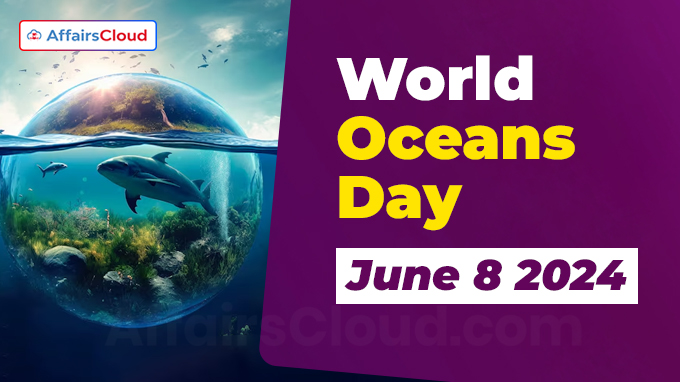
The United Nations (UN)’s World Oceans Day is annually observed across the globe on 8th June to raise awareness about the impact of human actions on the ocean, develop a global movement for ocean conservation, and unite the world’s population for sustainable ocean management.
- World Oceans Day reminds us of the oceans’ essential role in everyday life. Oceans’ are the lungs of our planet, a major source of food and medicine, and a vital part of the biosphere.
World Oceans Day 2024 was hosted by the Division for Ocean Affairs and the Law of the Sea of the Office of Legal Affairs (DOALOS) of the UN, in partnership with the non-profit organisation Oceanic Global.
- The theme of World Oceans Day 2024 is “Awaken New Depths.”
Objective of World Oceans Day 2024:
It showcases the urgent need to transform our relationship with the ocean and to motivate global action for ocean health and well-being.
Background:
i.Oceans Day was 1st proposed by the Government of Canada on 8 June 1992, at the Earth Summit in Rio de Janeiro, Brazil, a parallel event during the United Nations Conference on Environment and Development (UNCED).
ii.On 5 December 2008, the UN General Assembly (UNGA) adopted the resolution A/RES/63/111, proclaiming 8 June as World Oceans Day.
iii.The 1st ever World Oceans Day was observed on 8 June 2009.
Note: The United Nations Educational, Scientific and Cultural Organisation’s (UNESCO) Intergovernmental Oceanographic Commission (IOC) sponsors the World Ocean Network, supporting awareness events since 2002.
Key Points:
i.The IOC-UNESCO is the only UN body coordinating ocean observations, research, and ocean services among the member countries.
- It promotes international cooperation in marine sciences to improve the management of the ocean, coasts, and marine resources.
ii.The IOC is in charge of coordinating the UN Decade of Ocean Science for Sustainable Development 2021-2030, the “Ocean Decade”.
iii.Since 2002, The Ocean Project has coordinated World Ocean Day, aiming to unite global efforts for ocean protection.
2024 Multi-Year Action Theme:
i.Every year, an Action theme is set to unify efforts for World Ocean Day. The theme is designed to be adaptable for various celebrations and events worldwide.
ii.The 2024 Action Theme of World Oceans Day is, “Catalyzing Action for Our Ocean & Climate.” This initiative aims to:
- Utilise existing climate solutions effectively.
- Accelerate the transition to clean, renewable energy.
- Stop fossil fuel extraction and phase out single-use plastics.
- Collaborate with local leaders to implement community actions.
- Protect and restore natural coastal and ocean ecosystems (and on land) to protect areas covering at least 30% of lands and water by 2030.
- Develop science-based solutions at all levels.
Note: Through transformative collaboration, World Ocean Day aims to create a healthy blue planet and a more just, equitable, and sustainable society.
Key Facts:
i.The ocean generates 50% of our oxygen (O2), absorbs 25% of carbon dioxide (CO2) emissions, and captures 90% of excess heat from these emissions.
- It is essential for reducing global Greenhouse Gas (GHG) emissions and stabilising Earth’s climate.
- Approximately 80% of world trade is transported by maritime shipping, which accounts for 3% of global emissions.
ii.Ocean habitats like Seagrasses and Mangroves sequester CO2 up to 4 times faster than terrestrial forests, making them crucial in the fight against climate change.
- Mangroves: They store 1,000 tonnes of carbon per hectare, support fisheries, improve water quality, and protect coasts.
iii.Coral Reefs: They cover less than 0.1% of the ocean but support 25% of marine biodiversity and benefit a billion people through coastal protection, fisheries, medicine, and tourism.
iv.Marine Protected Areas, covering 6.35% of the ocean, are crucial for protecting coral reefs and mangroves and enhancing climate resilience.
v.Renewable Ocean Energy (Off-Shore Wind and Ocean Energy): These sources do not emit GHGs. Wind power could meet one-third of global power needs.
2024 Events:
On 7 June 2024, the UN hosted an in-person hybrid event to mark World Oceans Day 2024, at the UN Headquarters in New York, the United States of America (USA).
TripAdvisor’s Travelers’ Choice Awards: India’s Radhanagar Beach is the World’s 2nd Most Sustainable Beach
Every year TripAdvisor, the world’s largest travel platform publishes a ranking of the best beaches in the world as Travelers’ Choice Awards Best of the Best Beaches. For the 1st time, the 2024 ranking also includes a category for the most ‘sustainable beaches’.
- India’s Radhanagar Beach on the Havelock Island (officially known as Swaraj Dweep), was ranked 2nd in Tripadvisor’s Top 10 Sustainable Beaches in the World.
- Sandbanks Beach in Poole, United Kingdom (UK) was ranked 1st; and Saundersfoot Beach in Saundersfoot, UK ranked 3rd.
Note: In the 2024 ranking, European beaches took 7 of the top 10 spots.
About Radhanagar Beach:
i.Radhanagar Beach on the western coast, also known as Number 7 Beach, is one of the most popular beaches in Havelock across the Andaman and Nicobar Islands.
ii.It lies on the south coast of Swaraj Dweep and is about 12 kilometers (km) from the Islands ferry pier.
iii.Radhanagar is a Grade A beach of outstanding quality and has an overall length of 2 km and an average width of 30 to 40 meters.
Note: The beach was named “Best Beach in Asia” by TIME Magazine in 2004.
Click to see the Top 10 Sustainable Beaches of the World from TripAdvisor
Criteria for Selection:
i.For eco-conscious travelers, finding destinations committed to sustainability is paramount.
ii.The Travelers’ Choice Awards recognise these efforts, blending data from the data partners at BeCause (via the Blue Flag (BF) organisation) and internal Tripadvisor to highlight top eco-friendly destinations.
- The internal Tripadvisor data points, (including beaches) include the positive reviews from the Tripadvisor users’ discussions on sustainability.




